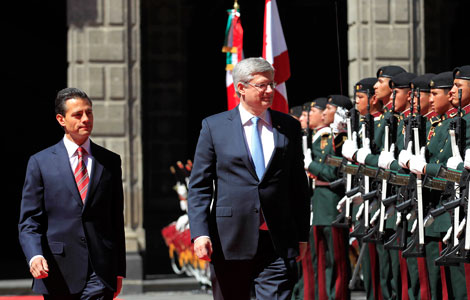

|
The entrance to the Ango-Chi International Logistics and Trading Park developed by Hasan International in Luanda. Provided to China Daily |
A businessman is keen to bring innovative methods to his African operations
The first business deal Zheng Gang did was selling eels that people in his village had gathered from rice fields. He was 8 years old.
Forty years later the eels are gone but Zheng's business instincts are as strong as ever. These days he runs a commercial and industrial empire that stretches around China and all the way to Africa. The company of which he is president, Hasan International, has fingers in many pies, including construction, hotel management, logistics and real estate, but the Sichuan native has now come up with what he thinks could be another huge money spinner.
In a sense, the idea harks back to Zheng's days selling eels. He then acted as a middleman, collecting eels from villagers who had gathered them in the rice fields, and selling them at the local market on their behalf. 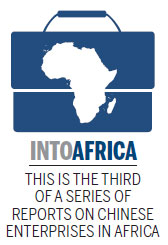
In his latest business model his playground is Africa, and he aims to get other companies pay Hasan hefty sums of money so they can trade on the success of the business parks it plans to build across the continent.
Their imperative for doing business with Hasan is that as they go to Africa, which Zheng first did eight years ago, the way they do business will have to change, he says.
"Just like China, Africa has different opportunities in different periods," he says. "When we first went there, selling clothes, vegetables and daily goods, it seemed whatever you did could make money."
Zheng says that for the past few years the threshold for entering the market has been raised, competition has become fierce, and the way businesses develop has changed. Profits in some sectors, such as trade and construction engineering, have fallen, while sectors such as real estate and processing are booming.
"Labor-intensive industries will still develop well for a while, but relying on cheap labor or cheap commodities to make profits is not as reliable as it used to be," says Zheng, also the newly elected vice-chairman of the China-Africa Business Council.
"Adding more value to products and factors such as technology, capital and talent will add competitive firepower, and entrepreneurs need to rethink their strategies and business models."
The business model Zheng is building in Africa is taking form in Luanda, capital of Angola. It is called the Ango-Chi International Logistics and Trading Park, which has been co-developed by Hasan International and local government departments since 2011. 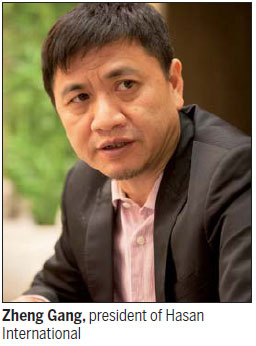
With an investment of $1.5 billion, the park will cover 2.6 square kilometers. A shopping area of about 40,000 sq meters is already operating, selling hardware, building materials, electrical equipments, textiles and furniture.
The completed project will not only provide facilities for logistics, production and trading, but also residential and office space. All supporting facilities, including shops, restaurants, exhibition centers, schools, hospitals and a transport center, will be built inside the park by Hasan International.
The Ghanaian government also authorized Hasan International to develop a 10-sq-km industrial park in Sekondi. The Sekondi Industrial Estate will promote engineering, development, construction and investment promotion.
After finishing high school, Zheng left the village to seek his fortune in the city of Nanchong. He sold vegetables, clothes and groceries and would later branch out into the lucrative fields of construction and logistics, founding Hasan International in 1993.
Zheng says he always felt an urge to innovate, and this led him to Africa, a land about which he knew little.
"I was not worried by the tough conditions in Africa when I first went there. Instead, I soon recognized it was the place where I could show my talent and pursue my dream."
In 2006, his first expeditionary team to Angola comprised 10 tents, 20 building tools and 30 workers. 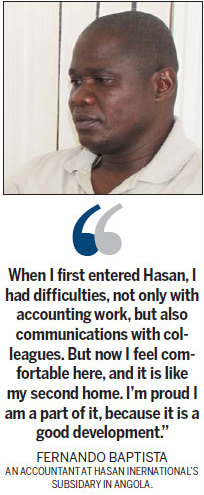
First working as a contractor for construction projects, the company's business now covers real estate development, industrial park development, mineral resources, international logistics, trade, investment and hotel management. Apart from establishing headquarters in Angola and Ghana, the company also operates in Nigeria, Mozambique and Kenya.
Zheng says that for the past few years its revenue from Africa has grown about 40 percent a year, and in 2013 it was about 2.2 billion yuan ($363 million). He expects it to reach 10 billion yuan in five years.
Unlike many other Chinese businesspeople in Africa, who made their first large profits there, Zheng entered the market after accumulating capital in China. He has always taken a long-term view of being in Africa, expecting his company to become well integrated into society there.
Coming from a poor family, even as a boy Zheng was careful with limited resources and this has helped him develop effective techniques in his African businesses.
"I would like to describe our strategy as a dumbbell," he says. "One side is the big potential of the African market, which offers opportunities we can seize, such as getting projects and setting up channels. The other side is the resources in China, such as capital, talent and technology, and Hasan aims to be the transverse bar that joins the two ends."
Zheng now visits Africa four or five times a year, and is prepared to snap up any new opportunities, but what challenges him now is how to build a high-quality international team. He now employs more than 2,000 Chinese and 1,000 locals.
"We have Chinese technicians, African technicians and sometimes Western technicians working together doing programs, but language is one barrier, because some speak Chinese, some English and some Portuguese," he says. "Many technicians have good technical skills, but just cannot overcome the language difficulties."
Also, his managers have to take into account different cultural backgrounds, attitudes and values.
"Often, when we make regulations, people from another culture don't understand, so you have to be flexible when managing the team. 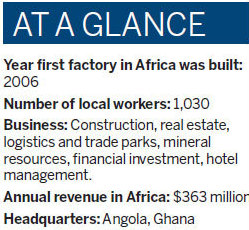
"For many Chinese companies that want to go global, Africa is like a good drill square. It's easy to get in there, but you can also practice skills for managing international teams and cross-cultural issues."
Zheng says that for the past few years, he has been focusing on the African market more than the domestic market. Now, with competition in Africa increasing, he does not want to put all his eggs in one basket. He wants to keep his experienced Chinese staff members with the company when they come back from Africa, and as that process develops he will give more attention to the domestic market.
And some African countries have started looking for opportunities in China. The Angolan government and businesses have been thinking about what to do after oil resources have been depleted, and this could create opportunities for Zheng, who knows the Chinese market very well.
(China Daily Africa Weekly 01/24/2014 page20)






